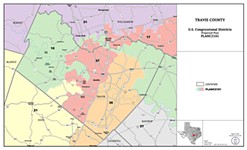Dred Scott, Revisited
Decision in redistricting case maintains a dismal Texas tradition
By Michael King, Fri., Jan. 16, 2004
And minority Texans, in the consequence of a bipartisan tradition dating at least to Reconstruction, are once again on the outside looking in.
Even the Republicans' token minority redistricting supporter, African-American state Rep. Ron Wilson, D-Houston, concedes that the new map is an exercise in raw power politics. "Anybody that can count could see they had the votes," Wilson said. "I could see that the train was moving, and I could either try to get a seat on the train, or watch the train pass by." The "seats" Wilson suggests he won with his support are the supposedly "new" minority opportunity seats in Houston and South Texas (Districts 9 and 25), although his argument depends on the extremely dubious presumption that in the absence of his public relations support (and that of Rep. Vilma Luna, D-Corpus Christi), the Republicans could have ignored the Voting Rights Act altogether and drawn an even whiter map. In fact, by the drawers' own estimations, this is the "most aggressive" map they could have produced -- and judging by the acquiescence of the Republican district judges, they have won their gamble. The train is steamrolling, indeed.
A more rational response was that of Austin state Sen. Gonzalo Barrientos, who called the judges' decision "in one word, awful," and then said he was particularly offended by the response of Attorney General Greg Abbott, who dismissed minority opposition to the map with the sort of condescension one associates with an earlier time in Texas racial relations. "I think that when minorities learn ... the real facts and the law about how their voting rights have been protected and about how there are new potential electoral opportunities for minorities," Abbott said, "I think you will find minorities of all kinds in the state of Texas will be very appreciative."
"We've definitely heard that kind of statement before," said Barrientos. "They know what's best for us."
Might Is Right
The court's majority had to strain more than a little to convince itself that the new map does not violate minority voting rights. They began by maintaining the now-institutionalized Republican myth that the 2003 redistricting is simply a retribution and replay of the 1991 Democratic redistricting: "The larger lesson of 1991 and 2003," write judges Patrick Higginbotham and Lee Rosenthal, "is that the only check upon these grasps of power lie with the voter." (Considering that the voters have been rendered powerless by the process itself, it's a feeble check indeed -- as the judges go on to imply.) In fact, that might have been the lesson of 2001, when the Republican leadership, looking for a better deal, punted its redistricting opportunity to the courts. But in 2003, with a legal map in place, the judges can't dodge quite that easily their own responsibility to inhibit legislative overreaching.
Like state attorney Andy Taylor -- who would hold up a Rorschach of 1991's original District 24 in the Metroplex (a custom-designed fiefdom for Martin Frost that was eventually rejected by the Supreme Court) whenever the testimony seemed to be going against him -- the majority opinion cites the presumably egregious 1991 map as ample precedent for this one. The courtroom refrain "better than the 1991 map," referring to districts that were eventually overruled, finally got to NAACP attorney Robert Notzon, who made his own automotive analogy to the state's defense. "You're trying to sell us a car, and you keep comparing it to the worst car that was ever manufactured," Notzon said. "That's some marketing strategy: 'It's not very good, but it's better than a Pinto.'"
But the most cynical response of the state, and an argument incorporated into the majority opinion, is that while many of the decisions in drafting the map undoubtedly harm minority voters, they were made primarily with partisan intent, and therefore cannot be convicted of racial motivation. Enumerating the hatchet-job performed on District 24, whose primarily African-American and Hispanic voters have now been dispersed into five separate Republican-dominated districts -- where those voters will have no effect on elections and no influence on officeholders -- the judges conclude, "The actions were not taken because of race; they were taken in spite of it."
By that logic, the Voting Rights Act only applies in those cases where the perpetrators publicly announce their intention to break the law. To put it another way: As long as the predominant intention of the redistricting process is partisan advantage, the fact that minority rights must be trampled to obtain that partisan advantage is what is now referred to in military parlance as "collateral damage."
It is this aspect of the opinion that led the NAACP's Gary Bledsoe to compare it to the Dred Scott decision: Under its terms, minority voters have no rights that a political party is bound to respect. "It took us decades to get the right to vote," Bledsoe said, "and then many more years to get the right to effective votes. This decision leaves us with the right to ineffective votes."
Small Comfort
Judge T. John Ward's quiet but eloquent dissent calls the majority's bluff on that question, among others, particularly in regard to Rep. Henry Bonilla's District 23, where the shell game was most blatant. The state claims it's OK to decimate a performing minority-opportunity district -- and the rights of the minority voters remaining in that district -- as long as you fabricate a new minority district elsewhere in the state (District 25), and magically transfer those rights to an entirely different group of minority voters. "Make no mistake about it," writes Ward. "These changes were designed to crush these minority voters' participation in the political process."
Although for lack of precise legal precedent, Ward refused to make the same charge concerning several other districts, it does not take a judge nor a political scientist to see that the Republicans' glorious victory over their Democratic rivals has been won largely at the expense of minority Texans, who face another decade of marginalization in state politics. As the saying goes, "When elephants battle, it is the grass that is trampled."
The presumptive odds are that Ward's clear-eyed conclusions will be overlooked at the Supreme Court, just as they were inartfully dodged by his colleagues. But for anyone cognizant of the record of Texas' treatment of its minority citizens, the decision in Session v. Perry has an all too familiar ring. ![]()
Got something to say on the subject? Send a letter to the editor.











